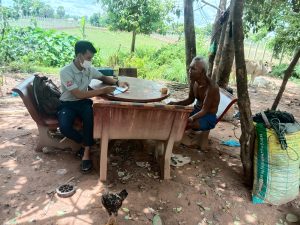For over two decades, The Documentation Center of Cambodia (DC-Cam) has been surveying the survivors of the Khmer Rouge regime to develop a better understanding of survivor needs, interests, and perspectives. Thanks to a generous grant from the United States Agency for International Development (USAID) in the summer of 2021, DC-Cam has been able to significantly expand its efforts in this area, particularly as it relates to developing a better understanding of the health and welfare conditions of survivors. As of August 2022, DC-Cam has collected information from over 31,000 Khmer Rouge survivors, and the following reflects some preliminary observations gleaned from this work.
Perhaps unsurprisingly, DC-Cam has found the majority of Khmer Rouge survivors who took part in its survey cited financial circumstances to be the primary reason for not seeking treatment for mental or physical health conditions, disabilities, or ailments. DC-Cam also found that among the physical or mental health conditions reported by survivors, hypertension and gastrointestinal disorders, followed by malaria, mental illness, and heart disease, were, in this order, the most important health concerns and debilitating conditions for survivors.
While DC-Cam has more work to do in developing an understanding of these issues, it is notable that these conditions also coincide with preliminary observations of survivor memories. Eighty-seven percent of survivors who were surveyed by DC-Cam reported having troubling memories of the Khmer Rouge period that resonated with them today, and 25 percent of respondents reported still suffering nightmares of this period, despite the fact that it occurred over 40 years ago.
Finally, DC-Cam found that medication, as opposed to visits to a public or private healthcare provider or hospital, is the primary method used for treatment in lingering or unexpected medical care needs. Survivors’ reliance on medicine to meet medical care needs may indicate that, rather than financial resources alone, one’s access to care may also be greatly influenced by other overlapping geographic or socio-organizational conditions of accessibility.
Access can be conceptualized in different ways — from the distribution of medical services, resources, and facilities to the external characteristics of a population, such as insurance coverage, attitudes to medical care, and income. It is possible that improving access, and consequently improving the health and welfare of survivors of atrocity crimes, may be less a matter of addressing the financial circumstances of survivors, and more a question about how to make medical care more convenient, trusted, and reliable.
DC-Cam’s research in this area is nowhere near complete, and these findings are preliminary in nature; however, they raise many questions and implications that bear significant relevance for ongoing and potential future work with the survivor community in Cambodia and in other post-conflict countries.
As DC-Cam continues its work in this area, we look forward to sharing our findings and recommendations with the public, not only to shine light on the plight, challenges, and barriers of access to essential health and social services for the survivors of the Khmer Rouge, but also where improvements can be made in the international community’s conceptualization of justice for survivors of atrocity crimes in all post-conflict societies around the world.

































